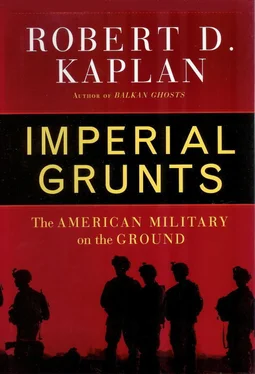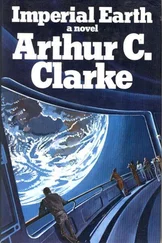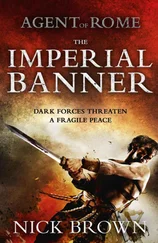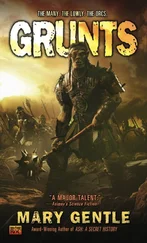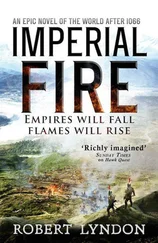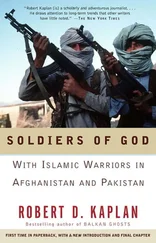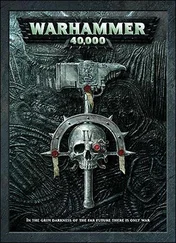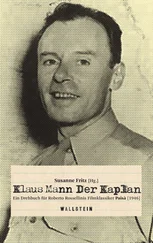I understood the feeling. If you were going to be a journalist, you should want to be where there was real reporting to do, not back in Washington covering press conferences or going on talk shows. And if you were going to join the military, I assumed you would want to fight.
The first WIA (wounded in action) had whetted 1/5’s appetite. It was an indicator that, as one marine put it, “the pace would pick up.” One senior noncom told me: “Mark my words, this SASO [stability and security operations—nation building] shit is going out the window. OIF-II will turn to be as violent as OIF-I.”
———
The 82nd Airborne finally departed the area. A ceremony was held in the chow hall handing over FOB Mercury to the Marines. Again, the chaplain delivered a benediction. Bagpipes sounded a Christian hymn and the “Marine Hymn,” and everybody shouted, “Ooh-rah.” The base was promptly renamed FOB Abu Ghraib (not to be confused with the prison), just as St. Mere was renamed FOB Al-Fallujah. The Marines, in keeping with their small wars tradition, consciously wanted to fit in with the local environment wherever possible.
Conditions at the renamed FOB Abu Ghraib got worse before they got better. Water for the showers ran out in the evening and on a few occasions ceased for up to thirty-six hours at a time, even as marines came back from patrols lathered in grime and sweat; nor was the electricity dependable. People had to scavenge for toilet paper and for plastic drinking water bottles even. The Kellogg, Brown & Root–staffed Army bases that I knew from Afghanistan and elsewhere appeared luxurious in retrospect. When the weather turned hot, the water problem became more acute. The Gunner joked that marines turn every place they go into a slum.
Soon living conditions began to improve—somewhat. Meanwhile, more and more HESCO baskets and Texas barriers were brought in to contain mortar and rocket blasts, which were unceasing. The mortar and rocket attacks from the direction of Al-Fallujah and Al-Karmah necessitated night-long patrols that were the essence of drudgery: hanging around in a suspect spot in the darkness, shivering, getting a headache from the night vision goggles, seeing and hearing nothing, then returning bleary-eyed at dawn, only to learn that soon after you left the place, a mortar was launched at the FOB from a nearby spot. [82] Army Special Forces called night vision goggles “NODs” (night optical devices).
Ten days after we had settled in, with nighttime attacks continuing, Lt. Col. Byrne established platoon-sized satellite bases beyond the FOB, which, in turn, dispatched fire teams that camped out at night and went on foot marches through the countryside. In short, the Marines were doing many of the things that Army Special Forces in Afghanistan had wanted to do, but which the regular Army in Bagram wouldn’t let them.
“It isn’t enough, though,” Gunner Bednarcik warned, shaking his head. “We need to put FOBs right in the middle of some of these towns, like Al-Fallujah and Al-Karmah.”
Events would prove him right.
On one patrol we found suspicious burn marks by a road near the Euphrates. The marks were in haystacks and berms, both of which could absorb the back blast of a mortar. Being near a road, the attackers could escape before the radar-driven “counter-battery” of the Americans destroyed the site. The perseverance paid off. One morning before dawn, I got up and walked across the FOB’s gravel expanse to the Porta-John to take a leak. On the way back, shuffling toward me, guarded by two marines, was a veritable Ghost of Christmas-Yet-to-Come. The hooded PUC (person under control), along with two others, had been caught with IED-making equipment, mortar materials, and a truck filled with sandbags on which a tire rested: the perfect makeshift mobile rocket-launching platform. Because their legs were caked with mud, it was assumed that the mortar caches were located alongside riverbanks and irrigation ditches.
Lt. Col. Byrne was under considerable pressure from his superiors on this issue. Truly, the law of military bureaucracy is that shit rolls downhill. “Your orders are to hunt and kill these fuckers,” one general commanded Byrne. “Bring me back dead folk.” The higher-ups knew that it was only a matter of time before one of the insurgents got lucky and hit a chow hall with a mortar or rocket during mealtime, or a crowded MWR (moral, welfare, and recreation) facility, killing dozens or more marines in one blow.
One blazing hot afternoon in the camp after a mortar attack, Pfc. Jason Igo, one of the Renegades, called out to me, “Hey, Bob, where ya from?” After I told him, I asked where he was from. “All over,” he said. “A military brat, uh?” I responded. “No, I was homeless. I lived in abandoned apartments, backyards, trailers, in Washington, Oregon, Minnesota…. I was abandoned at twelve, didn’t know my father till I was fifteen. His girlfriend didn’t like me, though.” Pfc. Igo had fought in OIF-I. He had no plans to reenlist. He wanted to attend a technical college in Arizona. The Marine Corps, he told me, had given him a stability that he had never had before.
———
FOB Abu Ghraib was a fighting camp, the one that I had been looking for throughout my travels. Once, coming back in the middle of the day from a patrol that had started before dawn, I found the base nearly empty; most of the marines were where they needed to be, outside the perimeter, in the midst of Iraqi towns and villages. If only more American bases in Iraq and elsewhere were like this, I thought—with few creature comforts and consequently a short support tail.
There was a particular sanctity about the chow hall: grim, badly lit, with depressing food, marines jammed together beside long tables, wearing flak jackets, gummed with dust, their rifles and helmets at their feet, every sixth marine or so quietly praying and crossing himself before starting to eat. Second Lt. David Russell of San Antonio, Texas, a graduate of the U.S. Naval Academy at Annapolis—a marine with an unfailingly delightful disposition—told me one evening, eyeing the mess hall: “Isn’t this place great! I love being here. It’s the new version of the Wild West, minus the booze, the whores, and the fun, of course. But we do have Indians in Iraq—good Indians and”—his voice lowering in mock seriousness—“very, very bad Indians.”
One day I went out with 2nd Lt. Russell and the rest of Alpha Company on a foot patrol through Nassir wa Salaam, a predominantly Shiite town in the midst of the Sunni Triangle. Nassir wa Salaam meant “Victory and Peace,” a bombastic artificial name that Saddam had given it. Its real name was Haswa, the place of gravel. Haswa was decked with flags and other Shiite regalia. In Iraq even the Sunni mosques, because of the Persian architectural influence, looked Shiite. Thus, it was only through the flags that you could tell from the outside whether a mosque was really Shiite or not: red and black flags for the Imam Hussein, the Shiite martyr massacred at Karbala in A.D. 680; green flags for Abbas, the Prophet Mohammed’s uncle and founder of the Abbasid caliphate based in medieval Baghdad; and yellow for the twelfth imam, whom Shiites believe is in occultation and will return to earth at some point.
Our first stop in Haswa was the police station, where the chief told us that as everywhere else in central Iraq since the toppling of Saddam, his town was besieged by a crime wave, carjacking in particular. As marines began to walk the streets they attracted hordes of kids and rough teenagers who had no jobs or schools to go to. They were friendly, but only because the Iraqi Shiite leader, Grand Ayatollah Ali Sistani, had told them to be.
The ICOMs suddenly stopped working. Lt. Russell looked up at the town’s sagging electric wires. “Yeah, the power lines here bleed electricity and knock out our intra-squad radios. If we get into trouble now, I can’t communicate with the rest of the company. It’s an example of how third world infrastructure defeats Western technology and power.” As often, the best communication turned out to be shouting.
Читать дальше
